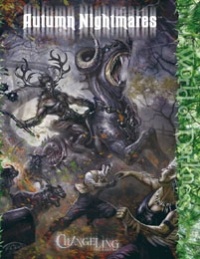Hedge Beast Companion
From Edge of Darkness Wiki
 Autumn Nightmares p. 132 | |
| Level(s) |
● (2XP) ●● (6XP) ●●● (12XP) |
|---|---|
| Venue | Changeling |
| Possessed By | |
| | This Merit is not available for purchase until the character has been in play for six (6) months. Purchasing this Merit DOES NOT mean having a second character. Yes, a Hedge Beast Companion is a physical ally with your Changeling and no doubt there is a strong bond between the pair but this does NOT make them a PC or even an NPC to be run by an ST. Just like any other Social Merit (Allies, Contacts, etc) a Hedge Beast Companion is a tool to be used when fulfilling their area of expertise and nothing more than fluff at other times. Pledges can only be made between PCs and ST run NPCs. |
This Merit represents a positive relationship between the changeling and the hobgoblin in question. The Hedge Beast is not a servant or slave, although it is likely to aid the character in whatever reasonable ways the Hedge Beast can in exchange for the changeling’s aid, support and protection. The hobgoblin is not likely to put itself into overly hazardous positions; safety and support are a large part of why Hedge Beasts take companions in the first place. Especially in the human world, however, people tend to ignore animals, allowing the Hedge Beast opportunity to witness or overhear many things that might otherwise be hidden from the hobgoblin’s Lost companion.
Unlike humans, Hedge Beasts do not begin with an assumption of one point in each Attribute. An insect companion may well have a Strength of 0, while a skittish ferret may have no composure whatsoever. A companion is built according to the following guidelines; Hedge Beasts more powerful than these assuredly exist, but are not in need of changeling protectors, and therefore do not seek out such relationships.
- • Attributes 15 points total, Skills 18 points total, Merits up to five points, two dots of Contracts, Wyrd 1
- •• Attributes 18 points total, Skills 21 points total, Merits up to seven points, four points of Contracts, Wyrd 2
- ••• Attributes 21 points total, Skills 24 points total, Merits up to nine points, six points of Contracts, Wyrd 3
It should be remembered that unique and exotic Hedge Beasts may be more difficult to explain to the mundane world. Cats and dogs are seen as common companions, and can even be registered as service animals to facilitate their presence in public places. Rats and other rodentia, birds, lizards or snakes may elicit a bit more attention, but are still likely to pass with- out too much problem. Insects, fish and horses may be a bit more difficult to explain, while animals seen as dangerous (wolves, big cats or bears) or endangered (Tasmanian devils, lemurs or many birds of prey) may not only draw huge amounts of attention but the wrath of the human authorities as well. Likewise, horses and other “beasts of burden” as well as large animals of other sorts may be difficult for an urban changeling to house. Since the Hedge Beast is entering into the companion relation- ship predominantly for protection and sanctuary, boarding the creature away from the changeling, or having it remain within the Hedge for the majority of the time is dis-satisfactory treatment. Changeling characters who lose their companions through neglect, abuse or disrespect, or those whose companions are killed receive no refund of their Merit points. Depending on the circumstances and whether the situation was their fault or simply bad fortune, characters may or may not have earned enough respect amongst other Hedge Beasts to encourage another to seek out their companionship. If so, the characters do not need to pay again for their new companions, but this circumstance is at the judgment of the Storyteller.
Changelings and companions can enter into pledge bonds that will strengthen and define their relationship. This is not implied by the Merit; any pledge bonds can be formed in the usual fashion.
|
| |||||||||||||||||
| Character Type | Changeling + |
| Merit Dots | 1 +, 2 +, and 3 + |
| Merit Type | Retainer + |
| Page has default formThis property is a special property in this wiki. | Merit Editor + |
| Parent | Autumn Nightmares +, and Retainer + |
| Permission | Allowed +, and House Ruled + |
| Source | Autumn Nightmares + |